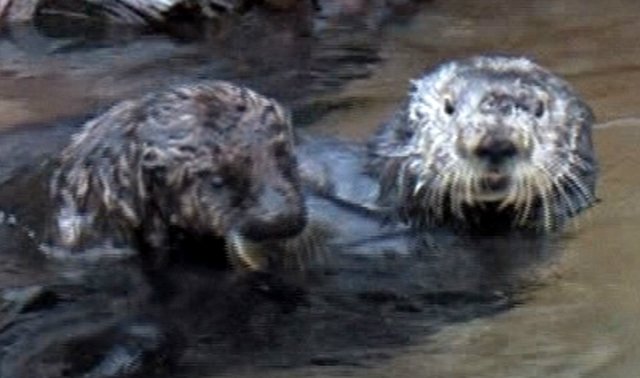Young Sea Otter joins
Otter Exhibit at the Oregon Coast Aquarium
The young sea otter, named “Mojo,” is acclimating to his new home
Newport, Oregon—A young rescued Northern sea otter was introduced to the Sea Otter Exhibit at The Oregon Coast Aquarium
under close supervision of Aquarium mammalogists today. The animal swam into his new home in the sea otter exhibit with the
other Aquarium sea otters and explored his new home, taking time to play briefly with one of the older resident otters.

Mojo-Hunter: Mojo (left), the Oregon Coast Aquarium’s new sea otter, is accepted by Hunter (right), an
older resident sea otter. Photo by Dave Terry
|
Mojo arrived in Oakland, California from the Alaska Sea Life Center in October and was transported to his new permanent
home at the Aquarium October 22. The male sea otter, deemed unsuitable for release to his natural habitat, was named “Mojo” by
his keepers in Alaska. A member of the Alaska Department of Fish and Game found the injured animal on a beach in Homer, Alaska.
At that time, the sea otter was estimated to be about six months old; too young to survive without its mother. When Meehan found
the sea otter, he alerted the Alaska Sea Life Center where the animal was sent for rehabilitation. Mojo is now about eight months old.
The Oregon Coast Aquarium has the largest exhibit of Northern sea
otters in North America. Mojo’s arrival is momentous for the
Aquarium because sea otters are an endangered species and aquariums cannot take animals from the wild for their exhibits,
unless it is a rescued animal that could not survive on its own and is non releasable.
“We are very excited to bring in this Alaskan sea otter pup that would not have otherwise survived in the wild,” said Jim Burke,
Aquarium Director of Animal Husbandry. “The transition period allowed him to acclimate to his new home and it was interesting to observe.”
Burke said the introduction was a slow, cautious process, with Mojo living in quarantine for two weeks immediately after his arrival.
“The quarantine was followed by brief supervised introductions to our other three sea otters, allowing plenty of time for them to get to
know each other and figure out how to cohabitate.”
Burke said a local pilot was instrumental in helping Aquarium staff with the transport. “I’d like to express gratitude to local pilot
Steve Schuster for his generous offer to fly Mojo from Oakland in the middle of the night with nearly gale force winds,” said Burke. “Without him,
the cost to bring Mojo to Newport would have been astronomical.”
After the rescued animal arrived at the Alaska Sea Life Center last summer, the animal underwent a CT scan to look for head trauma.
Mammalogists discovered a broken jaw and some lacerations, which took about two months to heal, requiring constant care and attention.
Due to the nature of his injuries, mammalogists believe the animal was injured by a boat. As the animal healed, he became increasingly
comfortable around the rehabilitation staff and interns that cared for him. Mammalogists report that Mojo is very curious, and easily
learned simple behaviors quickly, such as “stationing.” This makes tasks such as weighing stress free.
Mojo, a northern sea otter (Enhydra lutris lutris), will join three other sea otters at the Aquarium. The others include Aialik,
Judge and Hunter, all rescued animals that could not be released.
“Mojo weighs 35 pounds and is approximately eight months old,” said Judy Tuttle, Aquarium Curator of Mammals. Tuttle said he
is eating all the same food items that the other resident sea otters eat. “After two weeks, he was moved to the otter holding pool
for training for introduction to our resident sea otters,” said Tuttle.
Sea otters play a critical role in the marine ecosystem as a keystone species. They promote a healthy kelp forest that, in turn,
supports thousands of organisms. Sea otters are also an indicator or sentinel species. They are dying of diseases that have
land-based connections. Since humans and sea otters eat many of the same seafood items, high rates of sea otter disease may
be a warning for both human health and marine ecosystem health.
|
|


|
|